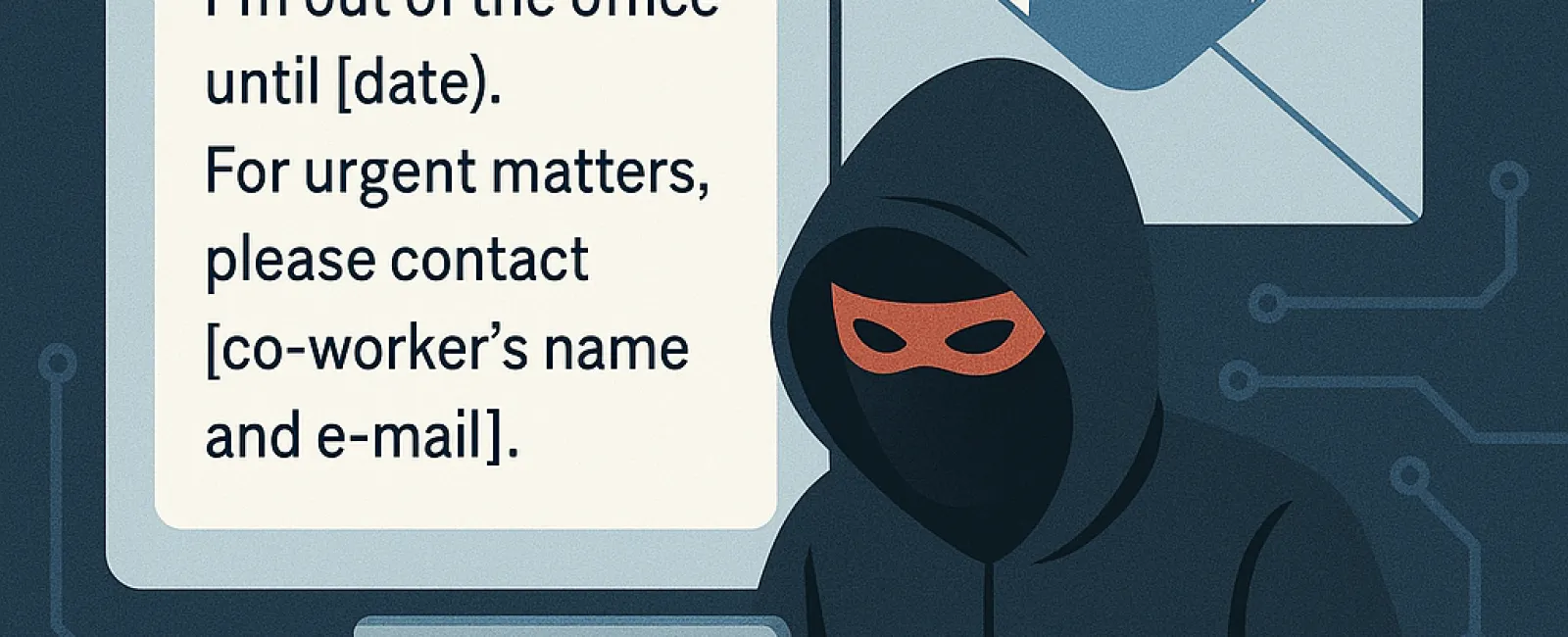June 16, 2025
Set it once and forget it. As you prepare for your vacation, your email auto-reply kicks in, instantly sending out messages like:
"Hello! I'm currently out of the office until [date]. For urgent assistance, please reach out to [coworker's name and email]."
At first glance, this seems helpful and harmless.
But this is exactly the kind of information cybercriminals crave.
What you intended as a simple, organized response actually provides a treasure trove of data for attackers seeking an easy entry point.
Consider what a typical out-of-office message reveals:
● Your full name and job title
● The dates you will be unavailable
● Contact details of colleagues covering for you
● Insights into your internal team structure
● Even reasons for your absence (e.g., "Attending a conference in Chicago…")
These details give hackers two key advantages:
1. Timing: They know exactly when you're away and less likely to detect suspicious activities.
2. Targeting: They can impersonate the right people and craft convincing scams tailored to your contacts.
This sets the stage for highly effective phishing or business email compromise (BEC) attacks.
How This Scam Typically Unfolds
Step 1: Your auto-reply message is triggered and sent out.
Step 2: A hacker uses the information to impersonate you or your designated alternate contact.
Step 3: They send a fraudulent "urgent" request for wire transfers, passwords, or sensitive files.
Step 4: Your colleague, caught off guard, believes the request is legitimate.
Step 5: You return from vacation to discover unauthorized transactions, such as a $45,000 payment sent to a fake vendor.
Incidents like this occur more often than you might expect, especially in businesses where employees frequently travel.
If your company's executives or sales teams travel regularly and rely on assistants or office admins to manage communications during their absence, this creates ideal conditions for cybercriminals:
● Admins juggle emails from multiple sources
● They handle sensitive tasks like payments and document processing
● They work quickly, trusting the identities they believe they're communicating with
Just one well-crafted fake email can bypass defenses, leading to costly security breaches or fraud.
Protect Your Business from Auto-Reply Exploits
Eliminating out-of-office replies isn't the answer. Instead, use them strategically while implementing protective measures. Here's how:
1. Keep Your Message General
Avoid sharing detailed schedules or naming who covers for you unless absolutely necessary.
Example: "I'm currently out of the office and will respond upon my return. For immediate help, please contact our main office at [main contact info]."
2. Educate Your Team
Ensure everyone understands:
● Never act on urgent financial or sensitive requests based solely on email.
● Always verify unusual requests through a secondary channel, like a phone call.
3. Deploy Advanced Email Security
Use robust email filters, anti-spoofing technologies, and domain protection to reduce impersonation risks.
4. Enforce Multifactor Authentication (MFA)
Activate MFA on all email accounts to block unauthorized access, even if passwords are compromised.
5. Partner with a Proactive IT Security Team
Work with experts who monitor login attempts, detect phishing, and flag suspicious activities before damage occurs.
Ready to Enjoy Your Vacation Without Cyber Risks?
We specialize in building cybersecurity defenses that keep your business safe—even when your team is out of office.
Click Here Or Give Us A Call At (925) 766-4005 To Schedule Your FREE 15-Minute Discovery Call.
We'll evaluate your systems for vulnerabilities and guide you on securing your environment, so you can truly relax without worrying about your inbox being exploited.





